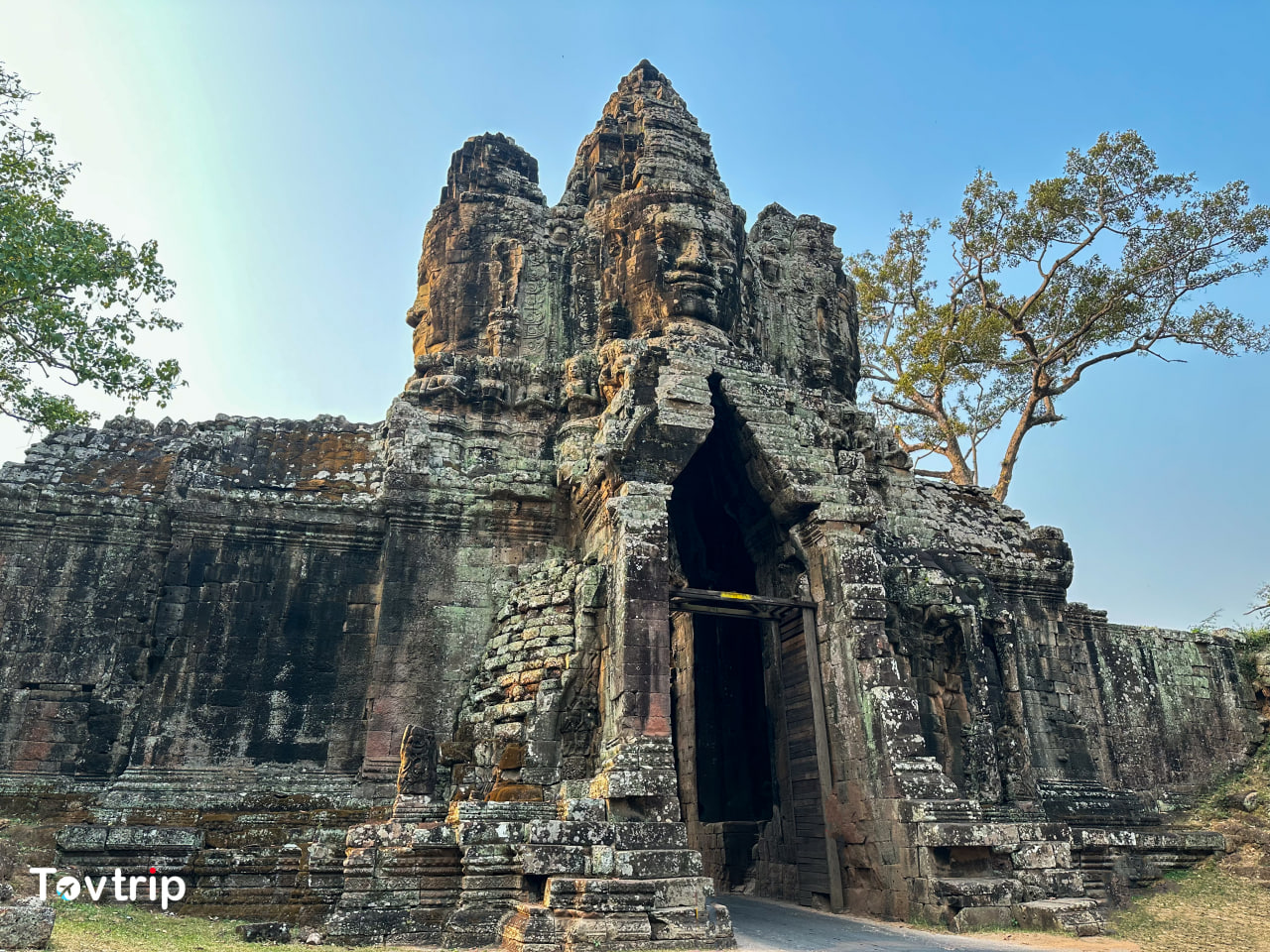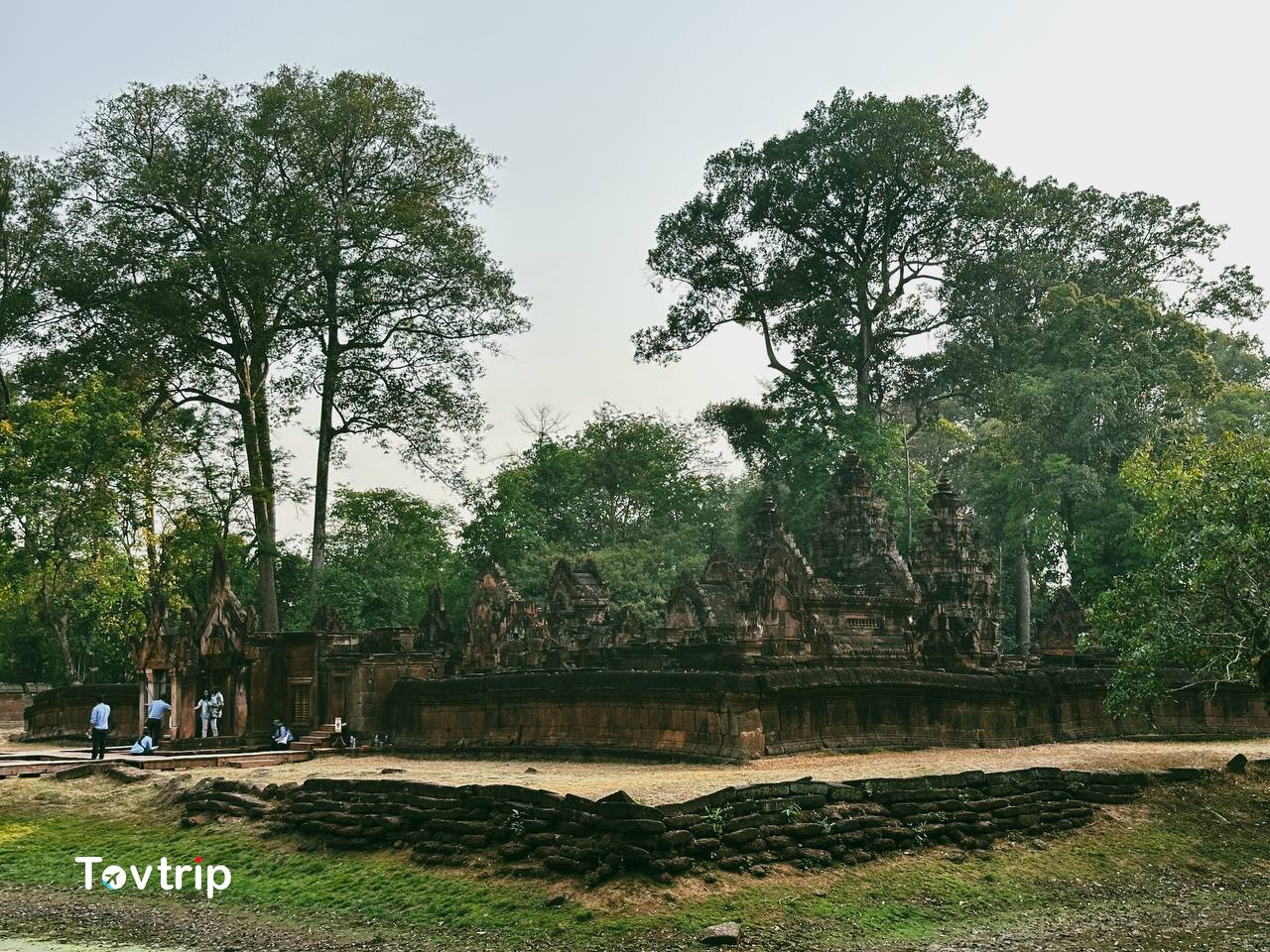
ប្រាសាទតាព្រហ្ម (Prasat Ta Prohm)
-
 By
Local-guide N003
By
Local-guide N003
- Date 13 Apr 2023
ប្រាសាទតាព្រហ្ម កសាងឡើងនៅក្នុងឆ្នាំ១១៨៦នៃគ្រឹស្តរាជ ដោយព្រះបាទជ័យវរ្ម័នទី៧ ដើម្បីឧទ្ទិសថ្វាយព្រះមាតារបស់ព្រះអង្គក្រោមរូបភាពប្រាជ្ញាបារមី។ ប្រាសាទតាព្រហ្ម មានទីតាំងនៅតាមផ្លូវវង់តូចទៅតាមទ្វារជ័យគឺ បន្ទាប់ពីប្រាសាទតាកែវ ប្រហែល១គីឡូម៉ែត្រ។ ប្រាសាទនេះរុំព័ទ្ធទៅដោយឈើធំៗដុះលើប្រាសាទ។ រួមទាំងមានភ្ញៀវជាតិ និងអន្តរជាតិ មកទស្សនាដើម្បីស្រាវជ្រាវ សំណង់ប្រាសាទ បូបាច់រចនា នៃតួរប្រាសាទ ទាំងមូល និងវត្ថុបុរាណដែលប្រាសាទនេះកើតតាំងពី សតវត្សទី១៣ គឺក្រោយប្រាសាទអង្គរវត្ត។
Jayavarman VII erected Ta Prohm in 1186 AD as a shrine for his mother, depicted as a wise woman. One mile after Takeo, on a narrow, twisting road leading to Ta Chey, is where you'll find Ta Prohm. Large trees that are growing on the temple surround it. National and international tourists are welcome to explore the temple's architecture, overall design, and artifacts. This temple was built in the 13th century, just after Angkor Wat.
Read More

ខ្លោងទ្វារទន្លេអុំ (Tonle Om Gate)
-
 By
Local-guide N003
By
Local-guide N003
- Date 25 Apr 2023
ខ្លោងទ្វារទន្លេអុំ(ទិសខាងត្បូង)ជាខ្លោងទ្វារមួយដែរមានចម្ងាយប្រមាណ ៨គីឡូម៉ែត្រពីក្រុងសៀមរាប ដែរធ្វើដំណើរតាមទក្សិណចូលទៅអង្គរធំដោយសងខាងអមទៅដោយចម្លាក់ទេវតា និងយក្សទាញនាគ ។សព្វថ្ងៃនេះអាជ្ញាធរជាតិអប្សរាបានដាក់ដំណើរការចរាចរណ៍ឯកទិសនៅខ្លោងទ្វារទន្លេអុំតាំងពីថ្ងៃទី២៨ខែមីនាឆ្នាំ២០១៦មកម្ល៉េះ(លើកលែងតែថ្មើរជើងនិងកង់តែប៉ុណ្ណោះ)ដោយអនុញ្ញាតចរាចរណ៍ចូលនិងគ្មានចរាចរណ៍ចេញចាប់ពីម៉ោង០៧:៣០នាទីដល់ម៉ោង ១១និង៣០នាទីព្រឹក (សជណ លេខ១២៣/១៦រប.សជណ ស្ដីពីការអនុវត្ដចរាចរណ៍ឯកទិសនៅខ្លោងទ្វាទន្លេអុំ ចុះថ្ងៃទី២៩ខែកុម្ភៈឆ្នាំ២០១៦ របស់អាជ្ញាធរជាតិអប្សរា)។ ខ្លោងទ្វារនេះគឺជាខ្លោងទ្វារខាងត្បូង ដែលជាខ្លោងទ្វារមានភាពមមាញឹកជាងគេ ដែលអាចឱ្យមនុស្សម្នាឆ្លងកាត់។ ខ្លោងទ្វារសាងសង់ឡើងដើម្បីធ្វើការរម្លឹកអំពីចម្បាំងឈ្នះកងទ័ពជើងទឹកចាមក្នុងរជ្ជកាលព្រះបាទសូរ្យវរ្ម័នទី២និងព្រះបាទជ័យវរ្ម័នទី៧ ។
Oum River Gate (South) It is also a gate that leads south to Angkor Thom from Siem Reap, some 8 km away, and is surrounded by statues of enormous dragons and angels. Since March 28, 2016, the APSARA Authority has operated one-way traffic at the Oum River Gate. (except pedestrians and bicycles). February 2016 of APSARA Authority) by permitting vehicles to enter and prohibiting traffic from 07:30 to 11:30 in the morning. The busiest gate that permits visitors to pass through is the south gate, which is where this one is located. During the reigns of Suryavarman II and Jayavarman VII, the gate was constructed as a memorial to the Cham fleet.
Read More

ប្រាសាទបាគង (Prasat Bakong)
-
 By
Local-guide N003
By
Local-guide N003
- Date 18 Apr 2023
ប្រាសាទបាគង មានទីតាំងស្ថិតនៅក្នុង ភូមិឪឡោក ឃុំបាគង ស្រុកបាគង ខេត្តសៀមរាប។ ហើយត្រូវបានកសាងនៅក្នុងរាជកាលព្រះបាទឥន្រ្ទវរ្ម័នទី១ នៅក្នុងឆ្នាំ៨៨១។ ប្រាសាទនេះធ្វើសម្រាប់ឧទ្ទិសដល់ព្រះឥសូរ ។ប្រាសាទបាគង គឺជាឈ្មោះថ្មី ដែលត្រូវបានហៅនៅសម័យកណ្តាល។ ប្រាសាទនេះផ្សំពីពាក្យ ប្រាសាទ+បា+គង។ ប្រាសាទ មានន័យថាទីកន្លែងអាទិទេពគង់នៅ។ មានន័យ ថាអ្នកគ្រប់គ្រងលោក អ្នកថែរក្សាលោក។ រីឯពាក្យ គង មានន័យថាគឺជាវត្ថុសម្រាប់បន្លឺសម្លេងឱ្យលាន់លឺរំពងខ្លាំង ហើយត្រូវបានអ្នកមានជំនឿលើអាទិទេព ប្រើប្រាស់ដើម្បីបង្កើតជាសូរសម្លេងដាស់លាន់លឺដល់ពួកអាទិទេពទាំងអស់។ តាមសិលាចារឹកនៃប្រាសាទនេះមានឈ្មោះដើមថា ឥន្ទ្រេស្វរៈ។ ប្រសាទបាគង មានខឿន ៥ជាន់ ដែលតំណាងឲឋាន ៥គឺឋាននាគ ឋានគ្រុឌ ឋានរក្សាសៈ (ឋានមនុស្ស) ឋានយក្ស និងឋានមហារាជ (ឋានអាទិទេព) ដែរមានតួប៉មចំនួន ១២។ ហើយ នៅទីនោះភ្ញៀវទេសចរក៏អាចទៅលេងទស្សនាកម្សាន្តអំពីស្ថាបត្យកម្ម ការសាងសងរបស់ប្រាសាទ និងថតរូបលេងកម្សាន្តផងដែរ។
Ovulok Village, Bakong Commune, Bakong District, Siem Reap Province is home to Bakong Temple. It was constructed in 881, during the reign of King Indravarman I. Iso is the patron saint of this temple. The term Bakong Temple was first used in the Middle Ages. The terms temple, ba, and gong are combined in this temple. Temple simply refers to the deity's residence. Ba translates as "You manage, you look after him." The word "gon" refers to a loud-sounding object that is employed by individuals who believe in gods to produce a sound that awakens all of the gods. This temple's original name, according to its inscriptions, was Indresvara. The five levels of the Bakong Temple correspond to the five levels of the Dragon, Guru, Reaksa (human), Giant, and Maharaj. (the Deity). 12 towers are present. Take pictures for enjoyment while exploring the temple's design and construction.
Read More

ប្រាសាទបន្ទាយសំរែ (Banteay Samre Temple)
-
 By
Local-guide N003
By
Local-guide N003
- Date 23 Feb 2024
ប្រាសាទបន្ទាយសំរែ មានទីតាំងស្ថិតនៅក្នុងភូមិព្រះដាក ឃុំព្រះដាក ស្រុកបន្ទាយស្រី ខេត្តសៀមរាប។ សាងឡើងនៅពាក់កណ្តាលគ្រិស្តសតវត្សទី១២ ដោយ ព្រះបាទសូរ្យវរ្ម័នទី២ សាងសង់ដើម្បីឧទិ្ទសដល់ព្រហ្មញ្ញសាសនានិកាយព្រះនារាយណ៍។ ប្រាសាទនេះត្រូវបានសាងសង់អំពីថ្មភក់ផ្សំជាមួយថ្មបាយក្រៀម ដែលយើងនិងឃើញជញ្ជាំងរបស់សាលវែងព័ន្ធជុំវិញដោយខ្ពស់សន្លឹម និងគ្រឹះខាងក្នុងរបស់ប្រាសាទត្រូវបានសាងសង់អំពីថ្មបាយក្រៀម ហើយដំបូលរបស់សាលវែងព័ន្ធជុំវិញតួប្រាសាទសាងសង់អំពីឈើនិងប្រក់ក្បឿង។ តួកណ្តាលប្រាសាទនេះមានរាងជាអក្សរធី ដែលលយចេញទៅទិសខាងកើតនិងមានទ្វារចំហមួយផងដែរ រីឯទ្វារបីទៀតដែលបែរមុខទៅទិសខាងជើង ខាងត្បូង និងទិសខាងលិចត្រូវបានបិទជិតដោយមានក្បាច់ចម្លាក់យ៉ាងល្អឯកនៅក្នុងផ្តៃទ្វារហើយនៅពីលើខ្លោងទ្វារក៏មានលម្អក្បាច់ចម្លាក់រឿងទេវកថាខ្លះផងដែរ។ ប្រាសាទនេះមានផ្លូវដើរសម្រាប់ចេញចូលបែរទៅទិសខាងកើតប្រវែងប្រហែល២០០ម៉ែត្រអមដោយបង្កាន់ដៃនាគអមសងខាងផ្លូវចូលបន្ទាប់មកមានរូបសំណាក់តោមួយគូរកំពុងឈរយាមផ្លូវចូល។
Preah Dak Village, Preah Dak Commune, Banteay Srey District, Siem Reap Province, is home to the Banteay Samre Temple. Built by King Suryavarman II around the middle of the 12th century AD and dedicated to the Narayan Brahmanical sect. The inner foundation of the temple is made of laterite, and the roof of the hall surrounding the temple is made of wood and tile. The temple is composed of sandstone and laterite, and we can see that the walls of the hall are encircled by high ceilings. The temple is shaped like a letter with an open door in the center that extends to the east. The three other doors, which face north, south, and west, are closed with beautiful carvings. Other mythological sculptures can be found above the gate and by themselves in the doorway. A 200-meter-long walkway leads to the temple's eastern entrance, where two lions are stationed to watch it. The entryway is accompanied by a dragon handrail.
Read More

ប្រាសាទបន្ទាយស្រី (Banteay Srei temple)
-
 By
Local-guide N003
By
Local-guide N003
- Date 29 Apr 2023
ប្រាសាទបន្ទាយស្រី ស្ថិតនៅក្នុងភូមិបន្ទាយស្រី ឃុំបន្ទាយស្រី ស្រុកបន្ទាយស្រី ខេត្តសៀមរាប ដែលមានចម្ងាយប្រមាណ ៣៩គីឡូម៉ែត្រទីរួមខេត្តសៀមរាប ។បា្រសាទនេះស្ថាបនាឡើងក្នុងឆ្នាំ៩៦៧នៃគ្រិស្តសករាជក្នុងរាជព្រះបាទរាជេន្ទ្រវរ្ម័នទី២(៩៤៤-១០០១) តាមសិលាចារឹកលេខ K-៨៤២ នាចុងសតវត្សរ៍ទី១០។ បន្ទាយស្រីជាឈ្មោះនៃរចនាបថប្រាសាទមួយដែលជួនកាលគេភ្ជាប់ទៅនឹងរចនាបថប្រែរូបផងដែរ ព្រោះរចនាបថទាំងពីរនេះស្ថិតនៅក្នុងសម័យកាលប្រហាក់ប្រហែលគ្នា តែយ៉ាងណារចនាបថបន្ទាយស្រីមានលក្ខណៈពិសេសលើសគេនៅត្រង់ក្បាច់លម្អ។ប្រាសាទបន្ទាយស្រីមានឈ្មោះល្បី ព្រោះវាត្រូវបានសាងសង់ឡើងពី ថ្មផ្កាឈូកជាមួយនឹងក្បាច់ចម្លាក់ យ៉ាងល្អិតឆ្មាររស់រវើកជាងគេ ដោយមានតួប្រាង្គបី ដែលមានសភាពល្អឆើតឆាយដូចស្រីគ្រប់លក្ខណ៍។ប្រាសាទនេះសង់លើដីរាបស្មើមានរាងតូចច្រឡឹងដោយថ្មភក់ផ្កាឈូកនិងឥដ្ឋរាង៤ជ្រុងទ្រវែង ហើយមានគូទឹកព័ទ្ធជុំវិញ ប្រាង្គទាំងបីនៃ ប្រាសាទសង់បែរមុខទៅទិសខាងកើត ហើយប្រាង្គកណ្តាលមានតម្កល់ លិង្គព្រះឥសូរ ខាងត្បូងឧទ្ទិសថ្វាយដល់ព្រហ្មញ្ញសាសនា និងខាងជើងឧទ្ទិសថ្វាយដល់ព្រះវិស្ណុ ។
The Banteay Srei temple is situated around 39 kilometers from Siem Reap in the Banteay Srei village, Banteay Srei commune, and Banteay Srei district of the Siem Reap province. At the end of the 10th century, in 967 AD, King Rajendravarman II (944-1001) No. K-842 constructed this temple. Often confused with the Transfiguration style since they both date from the same era, the Banteay Srei style of temple architecture is distinguished by its distinctive ornamentation. The three towers of Banteay Srei, which are as exquisite as a flawless woman, are made of lotus stone and have the most colorful sculptures. This is why it is so well-known. The temple includes three east-facing towers surrounded by a moat, and the central tower has a special southeast penis. It is made of sandstone, lotus, and rectangular bricks. Dedicated to Hinduism and Vishnu in the North.
Read More
Showing 71 - 75 of 105 posts

